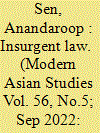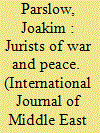| Srl | Item |
| 1 |
ID:
187285


|
|
|
|
|
| Summary/Abstract |
This article studies the adjudicatory practices deployed by colonial military and police forces during a series of punitive British expeditions in the eastern frontiers of British India and the northern reaches of British Burma, specifically the Lushai and Chin Hills in the late nineteenth century. It magnifies the lives, deaths, and afterlives of two ‘tribal’ chiefs of Lushai Hills. Among others, these figures were held responsible for a series of raids carried out in the settled British territories of the northeastern frontiers in the 1890s. After a few inconclusive skirmishes with the British expeditionary force, they were apprehended and imprisoned in a jail in Hazaribagh under the preventive detention act of Bengal Regulation III of 1818, which was reserved and designed to arrest political dissidents of the empire. After a few months, two of them, Liengpunga and Khalkam, were found hanging from the windows of their prison latrine. The British administration labelled these deaths as suicides and closed the cases. The article opens them up. In doing so, it narrates an oblique history of the Scheduled District Act of 1874 which removed hill districts from the jurisdictions of regular courts. By focusing on the historical imbrication of Bengal Regulation III of 1818 in the Scheduled District Act, the article highlights the punitive techniques embedded in the seeming protectionist impulse of the colonial state, something that persists in India's administration of the Northeast region. Closer to the concerns of this issue, it reflects on a legal genealogy of tribal subjects in South Asia.
|
|
|
|
|
|
|
|
|
|
|
|
|
|
|
|
| 2 |
ID:
158371


|
|
|
|
|
| Summary/Abstract |
The jurists who entered Turkish academia during the 1930s built the foundations of their discipline under a regime that became increasingly authoritarian as war drew closer. Like their peers in Italy and France, therefore, they had to produce coherent doctrines but also support the frequent use of exceptional emergency powers. How did they solve this contradiction? More importantly, what consequences did their solutions have for the use of emergency powers after the war? This article adopts a Deleuzian reading of two strategies with which Turkish jurists met that challenge, approaching their work not simply as theories about law but also as models for the role law should play in the articulation of public authority. Focusing on Ali Fuad Başgil and Sıddık Sami Onar, law professors at Istanbul University, I argue that although both professors supported the regime, only a situational doctrine of the kind Onar produced was capable of ensuring that jurists would have a place in the exercise of “exceptional” state powers after the 1950 transition to democracy.
|
|
|
|
|
|
|
|
|
|
|
|
|
|
|
|